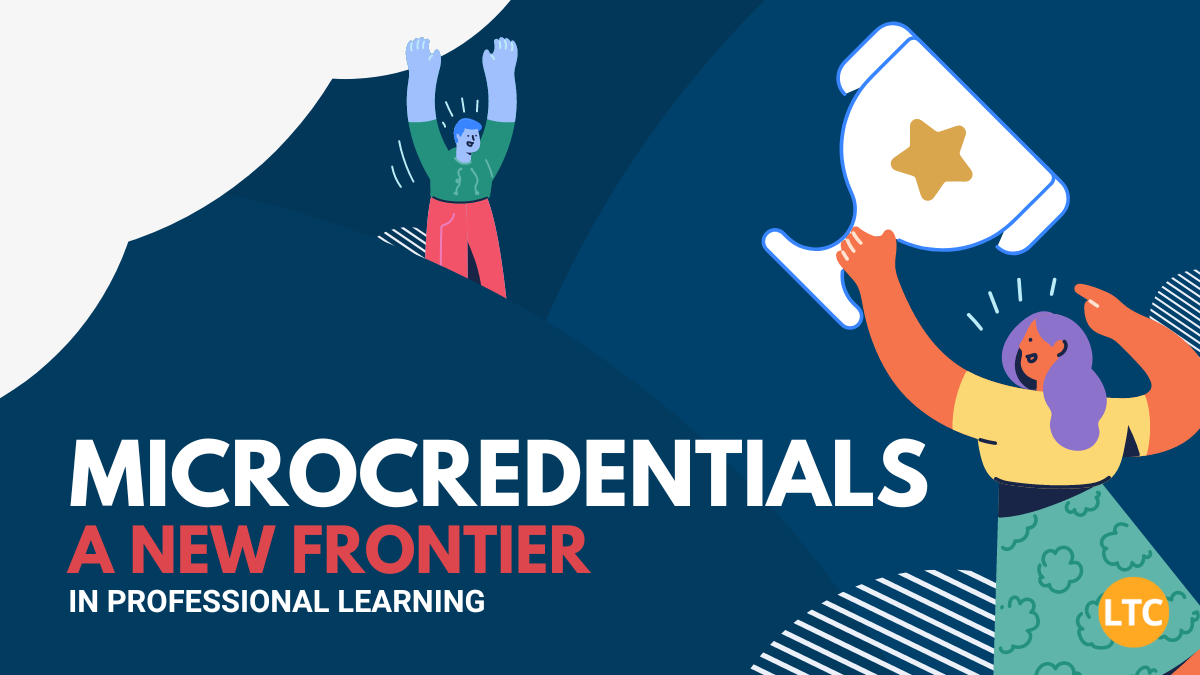Microcredentials: A New Frontier in Professional Learning


Updated November 15, 2022
There’s no two ways around it – the old “sit-and-get” method of professional development isn’t suited to the needs of today’s educators. Not only does that format encourage passive learning, but it also doesn’t offer teachers enough agency in their professional learning journey.
Fortunately, a new trend in professional learning is making it easier for educators to hone their skills and meet their own personal goals at the same time. Microcredentials have gained traction over the past several years, and they may soon become your go-to method for acquiring career-advancing skills.
But what is a microcredential? More importantly, how can a microcredential help you master a new classroom-ready skill?
Microcredentials are now available to Illinois educators, so now’s the right time to learn what this innovative professional learning method has to offer.
What is a Microcredential?
At a basic level, a microcredential is a condensed course of study that allows a participant to narrowly focus on a skill or set of skills within a chosen field. As their name suggests, a microcredential typically allows a participant to attain a certifiable proof of mastery, often in the form of a badge or transcript notation.
However, there’s more to a microcredential’s DNA than just a badge and a few hours of learning. Here are just a few factors that set microcredentials apart from other methods of professional learning:
Focused on Specific, Observable Skills
“Sit-and-get” professional development typically focuses on sharing knowledge with participants. Rarely do these in-service days offer participants the chance to actually apply what they are learning in real time.
Microcredentials, on the other hand, offer participants opportunities to practice and assess their new skills immediately. Microcredential stacks typically last for several weeks, allowing participants time to implement what they’ve learned in the classroom and ask questions of their instructor as they go along.
At the same time, microcredentials focus on a specific skill or set of skills. This allows them to dig deep and offer participants a chance to gain an adaptable understanding of the subject at hand. In turn, participants walk away with a greater capacity to apply what they’ve learned in the classroom without any delay.
Competency-Based
Along the same lines, microcredentials don’t take a participant’s understanding of the central topic as a given. Instead, a microcredential provides participants an opportunity to demonstrate their mastery before walking out of the digital classroom door.
For example, a microcredential instructor may ask a participant to supply artifacts of their skill implementation before the stack concludes. This ensures that the instructor is able to offer feedback and suggestions to the participant while they are still in the process of solidifying their competency.
Job-Embedded and Research-Based
Due to their focused nature, microcredentials teach skills that you can actually use on the job. Most microcredential stacks offered by education organizations relate directly to classroom strategies or pedagogy. So, you won’t walk away wondering how you’ll use what you just learned; you’ll already know because you’ve already done it.
Most microcredentials are also focused on well-researched skills and concepts. As a result, they typically have a demonstrable impact in the classroom, based upon prior implementation by other educators. Your participation in a microcredential will allow you to harness that research in the short-term, potentially leading to better outcomes for your students.
Personalized and Self-directed
One of the most marked trends in education right now centers around offering students agency and choice in the ways they learn. So, why shouldn’t educators be offered a similar level of agency when it comes time to hone their craft?
Microcredentials do just that by providing educators clear choices about which knowledge and skills they attain. Participants are often encouraged to work through an entire stack, but they also have the option of participating in only the segments that pique their interest. Either way, educators will be engaging in a personalized professional learning experience like no other.
Along the same lines, microcredentials offer participants more flexibility when it comes to actually sitting down and engaging with course content. That’s because many microcredential stacks offer a mix of synchronous and asynchronous participation options. As a result, teachers are able to more effectively pursue professional learning on their own schedule.
What is a Microcredential “Stack”?
On the surface, a microcredential may look like an online course you’ve participated in before. However, there are several noteworthy differences that allow microcredentials to be more flexible when it comes to their facilitation.
Generally speaking, a microcredential is much shorter in length than a full certification course. Many education-related microcredentials can be completed over the course of several months, rather than a year or more.
Also, microcredentials are arranged into “stacks.” A stack is usually made up of three or more modules that are united by a common thread or goal. When a participant completes every module in a stack satisfactorily, they become eligible for the badge associated with that microcredential.
This chart provides a closer look at how microcredentials are organized:


Who is using Microcredentials?
Microcredentials have become increasingly popular over the past several years, particularly in the education field. Numerous professional development providers have jumped on this trend and added microcredentialing options to their catalog of offerings.
Some of the most popular microcredential providers currently include:
Microcredentials and the LTC
The Learning Technology Center is continuously working to stay at the forefront of professional learning in the education field. That’s why we’re proud to announce our inaugural microcredential stack – Teaching the 4Cs with Technology – launching January 2023.
Featuring fully virtual synchronous and asynchronous instruction, this stack will consist of four badges centered around technology integration and research-back best practices:
Teaching Collaboration Skills with Technology
Duration: 3-4 Weeks


Building Communication Skills with Technology
Duration: 3-4 Weeks


Developing Student Creativity with Technology
Duration: 3-4 Weeks


Building Critical -Thinking Skills with Technology
Duration: 3-4 Weeks
Participants can pick and choose which badges to work toward based on their interest and availability. Educators who complete all four badges in this stack will earn a special badge and an ISBE-approved certification for their Professional Educator’s License (PEL).
Throughout the course, participants will also receive virtual support from LTC team members. On-demand support will also be available. Mastery will be evaluated by multiple experienced LTC team members, and participants will be able to submit artifacts of mastery as many times as necessary.
This microcredential is among the first approved under ISBE’s new microcredential framework. Strategies and practices in this course are aligned to Culturally Responsive Teaching and Learning standards, as well ISTE Standards, Illinois Computer Science Standards, and the Illinois Professional Learning Standards.
Earn an LTC Microcredential
Registration for our inaugural microcredential stack is now open. Click the button below to see all the microcredential courses available during Spring 2023.
For more information on microcredentials, including upcoming course dates and fees, visit our Online Courses & Microcredentials hub.
Further Readings on Microcredentials
Interested in learning more about microcredentials and the research supporting their efficacy? Check out these further readings and research:



Matt designs, develops, and evaluates the LTC’s digital professional learning, including working with subject matter experts to create learning objectives, conducting needs assessments, and delivering interactive online PD opportunities.



Sam leads and supports the execution and growth of LTC services through the development and creation of innovative, impactful, and timely digital content.

